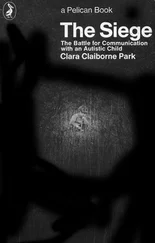Clara Park - Exiting Nirvana
Здесь есть возможность читать онлайн «Clara Park - Exiting Nirvana» весь текст электронной книги совершенно бесплатно (целиком полную версию без сокращений). В некоторых случаях можно слушать аудио, скачать через торрент в формате fb2 и присутствует краткое содержание. ISBN: , Жанр: Психология, на английском языке. Описание произведения, (предисловие) а так же отзывы посетителей доступны на портале библиотеки ЛибКат.
- Название:Exiting Nirvana
- Автор:
- Жанр:
- Год:неизвестен
- ISBN:0-316-69117-8
- Рейтинг книги:4 / 5. Голосов: 1
-
Избранное:Добавить в избранное
- Отзывы:
-
Ваша оценка:
- 80
- 1
- 2
- 3
- 4
- 5
Exiting Nirvana: краткое содержание, описание и аннотация
Предлагаем к чтению аннотацию, описание, краткое содержание или предисловие (зависит от того, что написал сам автор книги «Exiting Nirvana»). Если вы не нашли необходимую информацию о книге — напишите в комментариях, мы постараемся отыскать её.
All illustrations are by Jessy Park.
Exiting Nirvana — читать онлайн бесплатно полную книгу (весь текст) целиком
Ниже представлен текст книги, разбитый по страницам. Система сохранения места последней прочитанной страницы, позволяет с удобством читать онлайн бесплатно книгу «Exiting Nirvana», без необходимости каждый раз заново искать на чём Вы остановились. Поставьте закладку, и сможете в любой момент перейти на страницу, на которой закончили чтение.
Интервал:
Закладка:
I found out what Jessy was up against when we spent a season in France. I had thought I knew — Jessy was eleven and we had been working on language since she was two. But I had to become a foreigner to feel it. I had far more French than Jessy had English. Yet I was awash in a sea of sound. When people spoke directly to me — not from a distance, not as part of a general conversation — when they spoke slowly, distinctly, in words I knew, about a subject with which I was familiar, I could get the gist of what they were saying. An hour of this and I was exhausted. And this was what Jessy experienced every day. No wonder she tuned out, didn’t, couldn’t, pay attention.
I should make clear that though some degree of communication impairment is characteristic of autism, Jessy’s speech is by no means typical. Most autistic people who do acquire useful speech eventually sound much like the rest of us. They may speak too loudly, or with less variation of tone, as might be expected of people who cannot gauge their effect on others, but their fluency, vocabulary, and syntax are generally on a level with their intelligence. I don’t know another autistic person who functions as well as Jessy who has to labor so to assemble her words into something like English, who still speaks her native tongue like a foreign language. Dr. Wing, who saw Jessy at twelve, was struck by the gap between her nonverbal competencies and her speech; she concluded that her autism was complicated by another handicap, aphasia, which affects the ability to acquire and use not only words but the syntactic structures, the deep grammar that is the armature of language. Though Jessy was five when she began to acquire a vocabulary of single words, it was years before she could put them together into a recognizable sentence. Even at fifteen it wasn’t easy: «No wonder get egg». My account of Jessy’s language in The Siege was written when she was eight. Knowing it would be the longest in the book I called it «Towards Speech: A Long, Slow Chapter». I couldn’t know then that I had chosen the word «towards» not for her childhood, but for her whole life.
Much in that chapter still holds. I will not repeat it here; there is too much else to be told. Those with a particular interest in speech development may refer to those pages. Rather than linger on the details of that long, slow process — its steady achievements and its continuing limitations — I will let the anecdotes speak, those I’ve transcribed already and those to come. «A new fluffy-in-the-middle! Found in the newspaper!» What normal four-year-old wouldn’t say «I found it»? «If I don’t have any bread have a small egg». It wasn’t the printer who dropped out «I will». Those who speak pidgin know it makes talking easier not to deal with the pronouns and auxiliary verbs, especially when your mind is struggling with what you’re trying to say. «And people scream out loud and shout and whistle is a sound». The meaning is clear, but the grammar isn’t. Jessy has all the foreigner’s trouble with verbs and their transformations, with the indefinite and definite article, with pronouns of all sorts, with prepositions, with indirect discourse.
And simple, familiar words may come out even more oddly than ex post fracto. Jessy was in her thirties when, in a thank- you letter for a birthday gift of sheets, she wrote, «I will wear them on my bed next week». Preoccupied with questions like «What’s next?» and «Who’s next?» (she doesn’t like them), one day she asked, «Is there such a thing as ‘How’s next’?» Another day: «You can say ‘What are you looking for’ and ‘Who are you looking for.’ Can you say ‘Where are you looking for’?» When Hans Asperger spoke of the «original and delightful» language of his child patients, he was thinking of locutions like these. Jessy’s speech difficulties may be intensified by aphasia. But I doubt that a person struggling with aphasia would ask such questions.
It is not only in such bizarre «originality» that autism and aphasia differ. The communication handicap in autism goes far beyond the production and interpretation of actual speech. Communication is a richly interactive process. Human beings communicate not only by words but by gesture, by posture, by facial expression, by «speaking looks» — by what we rightly call body language. Aphasia does not affect this kind of understanding; if an aphasic child is thirsty it will use hand and mouth to mime drinking from a cup. The autistic child will not do this. Nor will she look at you or make an interrogative sound. Rather, she will take your wrist and lead you to the refrigerator. Unable to read the silent indicators with which human beings communicate as surely and significantly as they do in words, Jessy was adrift in a far deeper sea. The following chapter will tell some of the linguistic instruments that have helped her navigate.
Chapter 3
«When the time comes»
January 1989. More than a decade ago. We’re going away for a few days; a friend will be looking in on the cat. Jessy tells him, «I will teach you to feed Daisy when the time comes». I compliment her; I have long ago internalized the principles of reinforcement. «How nicely you said that».
«I learned that from you», she says. Then, «What does that mean, ‘when the time comes’?»
I try explaining, give up, tell her she really knows because she said it right. And she does know, because right away she supplies her own paraphrase. «In the future», she says. With that to go on, I can elaborate: the time is indefinite, yet it will come. Five minutes later (she’s been worrying that we’ll run out of garlic, though we have several cloves) she remarks, «I will buy garlic when the time comes». Of such small triumphs is progress made. And seeing me writing down our exchange she notes: «You will file that under Verbal» — as of course I will.
What would we do without these conventional phrases? We’d do fine, we’re told; the studied avoidance of such convenient formulas cliches — has become a hallmark of good writing, speaking, thinking. But for her they are not merely what they are for us, easy shortcuts to familiar meanings. Spend time with Jessy — years and years, say — and you can see how they serve not only to ease speech but to organize experience, to identify it, to articulate its recurrent patterns; how they enable her to cope with it, even, to some degree, to understand it. I learned that from you.
Jessy returns to these cliches again and again. She likes them, she uses them. So anxious over uncertainty, indefiniteness, anything that escapes strict predictability, she welcomes, needs, this prefabricated language. It helps her pattern the inevitable fluidity of being in the world. Once it was patterns of action that steadied her, routines that she tried to keep as invariant as possible. She still has these, but now there are also patterns of words. We can’t be sure when we will go shopping, when we will leave for the summer, when a friend will arrive. I will hang loose. A kitchen knife is missing. „Things come and go“. It doesn’t erase the anxiety, but it can assuage it. And to someone obsessively concerned about small mistakes, it’s comforting to hear that there’s such a thing as a „margin of error“. If naming perfectionism can’t control it, it can at least bring it to consciousness, where it can be worked on. „No big deal“. „Nobody’s perfect“. She can repeat the words, though she’s still far from accepting the fact.
Perfectionists do not make mistakes. They do not forget things. Jessy will wail, „Oh, I forgot to — add the salt, empty the trash — though her „forgetting“ has lasted less than a minute. Eventually I thought of a mollifying trick of language. „Don’t say you forgot, say you almost forgot“. And today, after the usual I forgot, she herself, her voice now audibly relaxed, supplies the paraphrase that is the guarantee of understanding. She even puts a positive spin on it: „I just remembered“.
Читать дальшеИнтервал:
Закладка:
Похожие книги на «Exiting Nirvana»
Представляем Вашему вниманию похожие книги на «Exiting Nirvana» списком для выбора. Мы отобрали схожую по названию и смыслу литературу в надежде предоставить читателям больше вариантов отыскать новые, интересные, ещё непрочитанные произведения.
Обсуждение, отзывы о книге «Exiting Nirvana» и просто собственные мнения читателей. Оставьте ваши комментарии, напишите, что Вы думаете о произведении, его смысле или главных героях. Укажите что конкретно понравилось, а что нет, и почему Вы так считаете.



![Майкл Азеррад - Come as you are - история Nirvana, рассказанная Куртом Кобейном и записанная Майклом Азеррадом [litres]](/books/392533/majkl-azerrad-come-as-you-are-istoriya-nirvana-ra-thumb.webp)



![Эверетт Тру - Nirvana - Правдивая история [litres]](/books/399241/everett-tru-nirvana-pravdivaya-istoriya-litres-thumb.webp)




